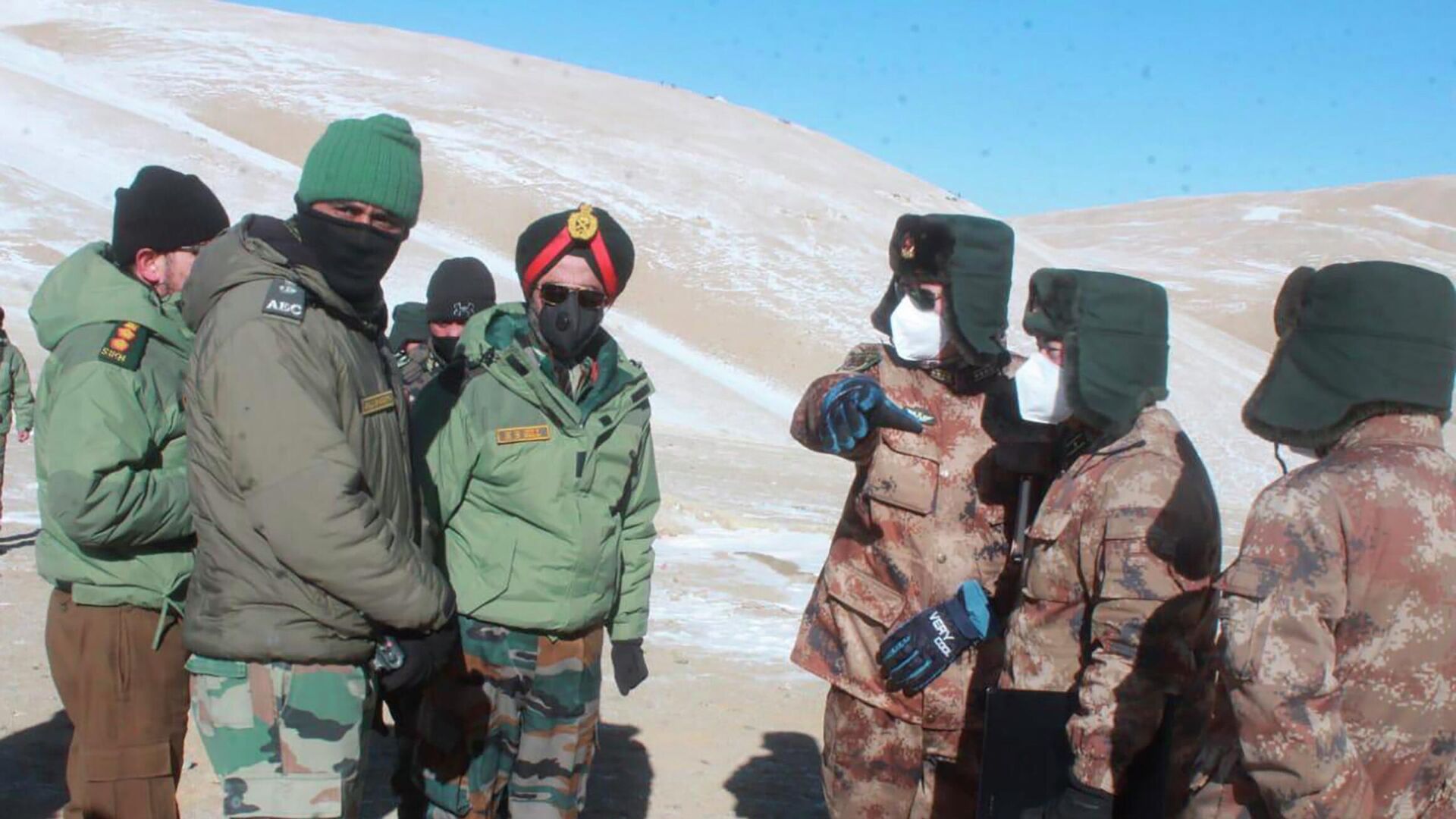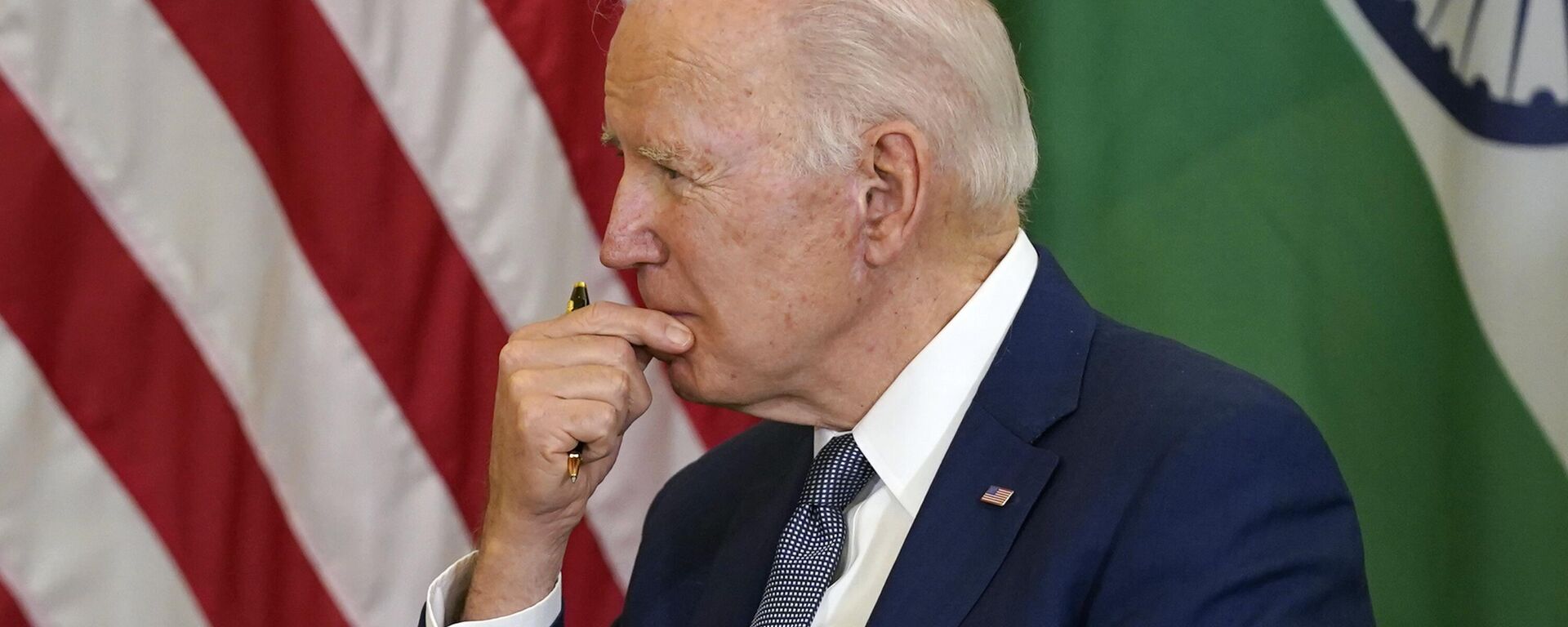https://sputniknews.in/20230726/china-india-amity-would-make-it-harder-for-us-to-intervene-in-ior-3196241.html
India-China Amity Would Make It Harder for US to Intervene in IOR
India-China Amity Would Make It Harder for US to Intervene in IOR
Sputnik India
The US has been trying its best through the “classic divide-and-rule tactics” to ensure there isn’t a thaw in the Sino-India relationship, a Hong-Kong based expert has told Sputnik.
2023-07-26T15:53+0530
2023-07-26T15:53+0530
2023-07-27T11:57+0530
india
china
people's liberation army (pla)
ministry of external affairs (mea)
brics
us
indian ocean
indo-pacific
south asia
quad
https://cdn1.img.sputniknews.in/img/07e6/0c/19/231390_0:0:2323:1307_1920x0_80_0_0_93536fc61403e179f4057115f6cdf299.jpg
The US has been trying its best through the “classic divide-and-rule tactics” to ensure there isn’t a thaw in the Sino-India relationship, a Hong-Kong based expert has told Sputnik.Polin, however, argued that an India-China detente seemed “highly unlikely” in the short term.The remarks come against the backdrop of a recent meeting between newly reappointed Chinese Foreign Minister Wang Yi and Indian National Security Advisor Ajit Doval on the margins of the ‘Meeting of BRICS National Security Advisers and High Representatives on National Security’ in Johannesburg this week.According to the Indian Foreign Ministry, Doval told Wang that resolving the ongoing military standoff in eastern Ladakh was critical to “remove impediments to normalcy in bilateral relations”.The Indian leadership says that the death of 20 Indian troops and five Chinese soldiers during clashes in the Galwan Valley in June 2020 profoundly disturbed bilateral relations.Both Doval and Wang concurred on the view that stabilizing the India-China ties was crucial not only for the stability of the Indo-Pacific but the entire world.India-China Should Make ‘Sincere Efforts’ to Resolve Standoff: ExpertPolin suggested that both India and China should “make sincere efforts” to resolve the ongoing border standoff in Ladakh.He echoed Beijing’s stance that both the countries should meet “halfway” in order to find a solution.Polin said that China’s approach towards inter-state relations was guided by the teachings of ancient Chinese philosopher Confucius, who stressed upon the need to achieve an “inter-state harmony” in the world.The expert reckoned the southeast Asian nations having maritime disputes with Beijing have been working on a ‘Code of Conduct’ for the South China Sea, which reflected Beijing’s emphasis on achieving “harmony” in the world.India-China-US Dynamic in Indo-PacificWhile the US President Joe Biden administration’s National Security Strategy (NSS) released last year described China as Washington’s “most consequential geopolitical challenge”.At the same time, successive US administrations have pushed Washington’s strategic partnership with India to contain China.New Delhi is a member of the US-led Quad grouping, which Beijing has compared to an “Asian NATO” in the past. India has also previously rejected an American offer of mediation in its border dispute with China, which was made by former US President Donald Trump. Military veterans and former diplomats have told Sputnik in previous interviews that New Delhi would continue with its policy of exercising "strategic autonomy" in foreign relations.
https://sputniknews.in/20230725/india-and-china-agree-detente-in-bilateral-ties-crucial-for-entire-world-3169018.html
https://sputniknews.in/20230601/sl-kanthan-us-not-interested-in-indias-strategic-autnonomy-2278320.html
india
china
us
indian ocean
indo-pacific
south asia
ladakh
Sputnik India
feedback.hindi@sputniknews.com
+74956456601
MIA „Rossiya Segodnya“
2023
Dhairya Maheshwari
https://cdn1.img.sputniknews.in/img/07e6/0c/13/138962_0:0:641:640_100x100_80_0_0_2cb44360dbcdf6d84bf4b299cd045917.jpg
Dhairya Maheshwari
https://cdn1.img.sputniknews.in/img/07e6/0c/13/138962_0:0:641:640_100x100_80_0_0_2cb44360dbcdf6d84bf4b299cd045917.jpg
News
en_IN
Sputnik India
feedback.hindi@sputniknews.com
+74956456601
MIA „Rossiya Segodnya“
Sputnik India
feedback.hindi@sputniknews.com
+74956456601
MIA „Rossiya Segodnya“
Dhairya Maheshwari
https://cdn1.img.sputniknews.in/img/07e6/0c/13/138962_0:0:641:640_100x100_80_0_0_2cb44360dbcdf6d84bf4b299cd045917.jpg
china india news, china india relations, china india war, china india border, china india detente, china india latest news, doval meets wang yi, doval china, doval news, us india news, us india relations
china india news, china india relations, china india war, china india border, china india detente, china india latest news, doval meets wang yi, doval china, doval news, us india news, us india relations
India-China Amity Would Make It Harder for US to Intervene in IOR
15:53 26.07.2023 (Updated: 11:57 27.07.2023) China's top diplomat and current Foreign Minister Wang Yi told Indian NSA Ajit Doval this week that China didn’t “pose a threat” to India and it would never seek hegemony like other global powers.
The
US has been trying its best through the
“classic divide-and-rule tactics” to ensure there isn’t a thaw in the
Sino-India relationship, a Hong-Kong based expert has told Sputnik.
“The predatory, domineering nature of the US is such that it would try to preserve hegemony in the Indian Ocean even if India and China were on good terms. A Sino-Indian amity would just make it a bit harder for the US to intervene effectively,” stated Thomas Hon Wing Polin, a regular commentator on Chinese foreign policy.
Polin, however, argued that an India-China detente seemed “highly unlikely” in the short term.
“The US needn’t worry about a thaw between New Delhi and Beijing because one seems highly unlikely right now,” the expert suggested.
The remarks come against the backdrop of a recent meeting between newly reappointed Chinese Foreign Minister Wang Yi and Indian National Security Advisor Ajit Doval on the margins of the ‘Meeting of BRICS National Security Advisers and High Representatives on National Security’ in Johannesburg this week.
According to the
Indian Foreign Ministry, Doval told Wang that resolving the
ongoing military standoff in eastern Ladakh was critical to “remove impediments to normalcy in bilateral relations”.
The Indian leadership says that the death of 20 Indian troops and five Chinese soldiers during clashes in the Galwan Valley in June 2020 profoundly disturbed bilateral relations.
Both Doval and Wang concurred on the view that stabilizing the India-China ties was crucial not only for the stability of the Indo-Pacific but the entire world.
India-China Should Make ‘Sincere Efforts’ to Resolve Standoff: Expert
Polin suggested that both India and China should “make sincere efforts” to resolve the ongoing border standoff in Ladakh.
“Just as India has grievances and complaints about China, the Chinese have grievances and complaints regarding India too. No territorial disputes can ever be resolved unless both sides make sincere efforts. One hand clapping makes no sound,” the expert said.
He echoed Beijing’s stance that both the countries should meet “halfway” in order to find a solution.
“For some time now, China’s attitude has been that it is prepared to meet India halfway, for the sake of an improved overall relationship,” he said, noting that Beijing has been asking New Delhi to place the border dispute at a proper level in the overall bilateral ties.
Polin said that China’s approach towards inter-state relations was guided by the teachings of ancient Chinese philosopher Confucius, who stressed upon the need to achieve an “inter-state harmony” in the world.
The expert reckoned the southeast Asian nations having maritime disputes with Beijing have been
working on a ‘Code of Conduct’ for the South China Sea, which reflected Beijing’s emphasis on achieving “harmony” in the world.
“Encouragingly, the parties have been working on a Code of Conduct that should ease tensions and help prevent disastrous accidents. An agreement might even come later this year. (But) American intervention, hostile to China, has complicated things significantly,” Polin warned.
India-China-US Dynamic in Indo-Pacific
While the US President Joe Biden administration’s National Security Strategy (NSS) released last year described China as Washington’s “most consequential geopolitical challenge”.
At the same time, successive US administrations have pushed Washington’s strategic partnership with India to contain China.
New Delhi is a member of the
US-led Quad grouping, which Beijing has
compared to an “Asian NATO” in the past.
India has also previously rejected an American offer of mediation in its border dispute with China, which was made by former US President Donald Trump.
Military veterans and former diplomats have told Sputnik in previous interviews that New Delhi would continue with its
policy of exercising "strategic autonomy" in foreign relations.




